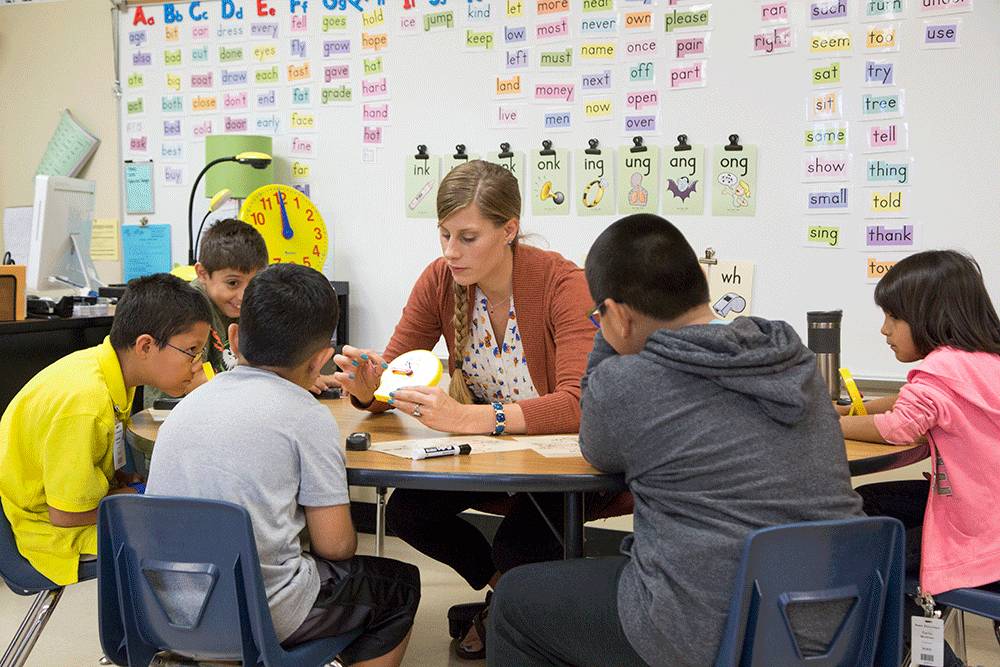Elementary Education (M.A./M.Ed.) (Early Childhood Education)
M.A./M.Ed. Elementary Education

Program Overview
This 30-hour, flexible degree, creates the opportunity for students to dive deeply into the ways in which the youngest of our students and their families are served within the context of elementary education. Whether that dive is into the newest teaching methods for the young, societal issues impacting the youngest recipients of education, or factors to consider in designing curriculum for the young, there are multiple offerings taught by leading researchers and pedagogues in the field of early childhood education within curriculum and instruction. Students who wish to engage in their own research project can opt for the Master of Arts in Elementary Education (M.A.), which includes the design and implementation of a research project. This project becomes the basis for the writing of a thesis. Students who want graduate coursework only can choose the Master of Education (M.Ed.) and complete 30 hours of courses to earn the M.Ed.
Course Work
The graduate courses in the early childhood concentration are designed to work in concert as an exploration of the schooling experiences of the youngest of students, their families, schools and teachers. This unique program can include hands-on, experiential summer coursework involving co-teaching in a play-based literacy and STEM curriculum alongside certified teachers in a public-school setting with students aged 3 to 8 who speak Spanish, English or both. Additionally, through courses like language acquisition, methods for teaching English as a second language, multicultural education and the politics of language, societal factors that shape educational experiences are explored and responsive ways of creating learning environments are investigated. Through courses like math and science methods, teaching literacy, social studies methods, teachers learn pedagogical methods for meeting young students’ learning needs. Several electives, such as ‘creativity,’ and teaching literacy using YA fiction and children’s literature, are available.
Master's Degree Programs
| Degree | Concentration | Hours | Thesis Option | Minor Option | Location |
|---|---|---|---|---|---|
Degree M.Ed. | Concentration Early Childhood Education | Hours 30 | Thesis Option Non-Thesis | Minor Option Minor required | Location San Marcos |
Degree M.A. | Concentration Early Childhood Education | Hours 30 | Thesis Option Thesis | Minor Option Minor required | Location San Marcos/Round Rock |
Program Details
This program is designed for educators working with or interested in the youngest of school children to develop advanced knowledge in pedagogy, curriculum and sociocultural understandings of learning, schooling, teaching, human development, sociolinguistic development, and societal factors influencing the education of young learners. Educators interested in curriculum design, responsive pedagogies and career advancement in public or private education, policy, and curriculum design will benefit from this program’s offerings.
Program Mission
The Elementary Education master’s program with a concentration in Early Childhood Education:
- prepares students for advanced work in education.
- prepares educators to engage in theory and practice in new ways.
- offers the acquisition of new perspectives and skills, development of specialized knowledge, preparation to work with student teachers, preparation for leadership among teachers, and preparation for advanced graduate study.
Career Options
The Elementary Education master’s program with a concentration in Early Childhood Education:
- prepares students to enter a new phase of their career as an educational specialist (e.g., curriculum developer, curriculum supervisor/coach, pedagogical specialist, etc.).
- leadership in early learning schools.
- curricular design and implementation in early learning environments.
- prepares students for PhD study.
Program Faculty
The faculty of the graduate concentration in Early Childhood Education specialize in:
- the intersection of languages, cultures, society factors, and identities with learning of the youngest students across the content areas and with deference to the ‘whole child’—the linguistic, cultural, social, emotional, cognitive and physical domains of growth and engagement.
- complex exploration of the concept of “play” as it pertains to human interaction, encounters with others and the world, problem-solving, theory building, and advocacy of the young and for the young.
- the intersection of knowledge, skills, and schooling as they pertain to the youngest of students in terms of:
- Sociohistorical Contexts
- Linguistic Contexts
- Play-based learning environments
- Complicated histories and difficult conversations
- Responsive Pedagogies
- Curriculum Design
Contact us for general questions about your application, funding opportunities, and more. If you have specific questions after reviewing the program details, contact the program's graduate advisor.

Apply Now Already know that Texas State is right for you?
Application Deadlines
| Deadlines | U.S. Citizen | International |
|---|---|---|
Deadlines Fall - Priority | U.S. Citizen February 1 | International February 1 |
Deadlines Fall - Standard | U.S. Citizen June 15 (*Flexible) | International June 1 |
Deadlines Spring | U.S. Citizen October 15 (*Flexible) | International October 1 |
Deadlines Summer I | U.S. Citizen April 15 (*Flexible) | International March 15 |
Deadlines Summer II | U.S. Citizen June 1 (*Flexible) | International No Admission |
*This program’s deadline is flexible for those not requiring an F/J visa. A flexible deadline means applications received after the standard deadline may be reviewed on a first-come, first-served basis with no guarantees for admission consideration.
|
|
Funding Information Applications must be complete by the priority deadline to be considered for certain types of funding. |
|
|
Decision Timeline This program reviews applications on a rolling basis. |
Admission Requirements
The items required for admission consideration are listed below. Additional information for applicants with international credentials can be found on our international web pages.
-
Application
- Completed online application
Review important information about the online application.
-
Application Fee
- $55 nonrefundable application fee
OR - $90 nonrefundable application fee for applications with international credentials
There are additional fees associated with certification programs to be paid after admission. Review important information about the additional fees to be paid.
- $55 nonrefundable application fee
-
Transcripts & GPA
- baccalaureate degree from a regionally accredited university (Non-U.S. degrees must be equivalent to a four-year U.S. Bachelor’s degree. In most cases, three-year degrees are not considered. Visit our International FAQs for more information.)
- a copy of an official transcript from each institution where course credit was granted
- a 2.75 overall GPA or a 2.75 GPA in your last 60 hours of undergraduate course work (plus any completed graduate courses)
Review important information about transcripts. Official transcripts, sent directly from your institution, will be required if admission is granted.
-
Test Scores
GRE
- GRE not required
Approved English Proficiency Exam Scores
Applicants are required to submit an approved English proficiency exam score that meets the minimum program requirements below unless they have earned a bachelor’s degree or higher from a regionally accredited U.S. institution or the equivalent from a country on our exempt countries list.
- official TOEFL iBT scores required with a 78 overall
- official PTE scores required with a 52 overall
- official IELTS (academic) scores required with a 6.5 overall and
- minimum individual module scores of 6.0
- official Duolingo scores required with a 110 overall
- official TOEFL Essentials scores required with an 8.5 overall
This program does not offer admission if the scores above are not met.
Review important information about official test scores.
-
Documents
- one-page statement of purpose on why you wish to teach
- three letters of recommendation
Review important information about documents.